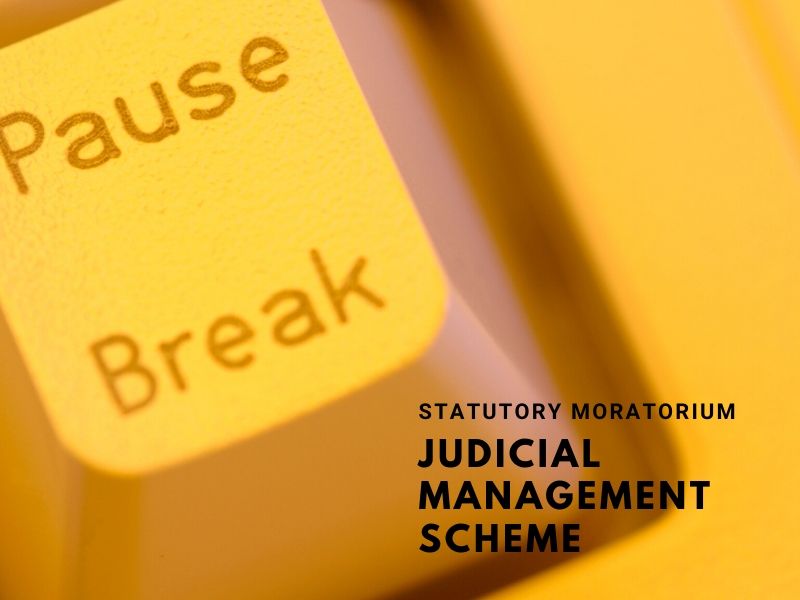The Statutory Moratorium under The Judicial Management Scheme
by Sean Tan Yang Wei ~ 28 March 2020


Lavinia Kumaraendran
Email: lkk@thomasphilip.com.my

Sean Tan Yang Wei
Email: tyw@thomasphilip.com.my
INTRODUCTION
The Companies Act 2016 introduced the Judicial Management system as a scheme to rescue businesses in financial distress. One of the salient and most important features of the Judicial Management scheme is that it provides for a statutory moratorium on all proceedings, execution and legal process against the company. This essentially prevents third parties, such as creditors of the company, from commencing or proceeding with any legal action against the company without the leave of Court.
PURPOSE OF THE STATUTORY MORATORIUM
Generally, the statutory moratorium provided under the Judicial Management scheme is intended to give the company in financial distress come breathing space and be protected from having to fend off multiple legal proceedings from various disgruntled creditors and other third parties who are seeking to recover their debts from the company. As legal and other execution proceedings can be expensive and time-consuming to fend-off, the protection offered by the statutory moratorium would mean that the company would not need to expend precious resources to oppose these proceedings.
Instead, these resources can then be channelled into more productive efforts towards rescuing the company in financial distress. It would allow the Judicial Manager the time and protection they need to come up with a rescue or restructuring plan without having to deal with the constant pressure arising from the legal proceedings. The statutory moratorium would also protect the status quo and the assets of the company from being dismembered through various execution proceedings before a Judicial Manager is appointed. This would ensure that any application for judicial management is not hindered or rendered futile by any legal or winding up proceedings filed against the company.
The moratorium also prevents any one creditor from potentially gaining priority over the others through exerting pressure on the company in the form of legal proceedings.
THE INTERIM AND PERMANENT MORATORIUM
Under the Judicial Management scheme, two slightly different types of moratoria would take effect at different stages of the process, namely the interim moratorium and the permanent moratorium.
The Interim Moratorium
Firstly, a temporary or interim moratorium takes effect immediately upon the filing of an application for Judicial Management pursuant to Section 410 of the Companies Act 2016. This interim moratorium lasts until either the application for Judicial Management is dismissed or is allowed. The interim moratorium under Section 410 provides that:
(a) No resolution shall be passed or order made for the winding up of the company;
(b) No steps shall be taken to enforce any charge on or security over the company’s property or to repossess any goods in the company’s possession under any hire purchase agreement, chattels leasing agreement, or retention of title agreement, except with the leave of Court and subject to such terms as the Court may impose; and
(c) No other proceedings and no execution or other legal process shall be commenced or continued and no distress may be levied against the company or its property except with leave of the Court and subject to such terms as the Court may impose.
The mechanism of the interim moratorium means that the company’s assets are protected even before an order for Judicial Management is made to ensure that the Judicial Manager (if eventually appointed) would be able to rescue or restructure most the company without having the company being further drained by the costs of these legal proceedings.
The Full Moratorium
Once a Judicial Manager is appointed, the full moratorium will take effect pursuant to Section 411 of the Companies Act 2016 from the date of the order until the Judicial Manager is discharged. In addition to the terms of Section 410, the terms of the full moratorium under Section 411 also extends to provide that:
(a) No receiver or receiver and manager of the kind referred to in section 374 shall be appointed; and, (b) No steps shall be taken to transfer any share of the company or to alter the status of any member of the company except with the leave of the Court and, if the Court grants leave, subject to such terms as the Court may impose.
SCOPE OF THE STATUTORY MORATORIUM
Legal and Execution Proceedings
Firstly, Sections 410 and 411 of the Companies Act 2016 make it clear that essentially all legal proceedings against the company are prevented from being commenced or proceeded with by the statutory moratorium.
Legal suits filed against the company would therefore be stayed unless leave of Court is obtained to proceed. Similarly, winding up petitions and other execution proceedings such as writs of seizure and sale would also be stopped by the statutory moratorium[1].
The statutory moratorium also extends to quasi-judicial proceedings such as adjudication and arbitration proceedings[2]. As such, if any of these proceedings are pending when an order for Judicial Management is made, they will also be stayed by the statutory moratorium.
It must also be borne in mind that the statutory moratorium merely pauses or temporarily stays the rights of the company’s creditors to enforce their debts against the company. These debts remain and are not extinguished outright. However, the statutory moratorium does not stop time running in respect of limitation[3].
Enforcement of Security and Other Contractual Rights
Besides legal processes or legal suits, the company under judicial management is also protected from other actions by creditors to enforce a debt. For instance, banks or hire- purchase lenders would not be able to take steps to repossess the assets of the company without the leave of Court. However, it is unclear whether a creditor is prevented by the statutory moratorium from making a demand for repayment under such financial facilities and whether such demand constitutes a “step taken” towards the enforcement of a security.
Nevertheless, certain steps or applications which appear to be a step of enforcement against the company are not prevented by the statutory moratorium. For example, an application for an extension of time to register a charge is not prevented by the statutory moratorium as it does not constitute a proceeding against the company or its property. The test appears to be whether such action or application is one which can equally be made by the company while it was a going concern[4].
Certain contractual rights which creditors possess against the company are also not stayed by the statutory moratorium. One example includes the right to a set-off, which is considered a personal right which is not related to a real or proprietary interest against the company[5]. Similarly, a creditor would also have the right to terminate a contract with the company for breach of contract although the creditor would likely be prevented from pursuing any damages or recovery against the company arising from the breach by the statutory moratorium.
Can the Company Commence Proceedings?
As the statutory moratorium only provides protection to the company from legal and execution proceedings, there is nothing to prevent the company from commending or continuing proceedings against a third party[6]. This also means that a third party which is being sued by the company under judicial management would not be prevented from taking the necessary defensive steps against the company.
WHAT RECOURSE DO THIRD PARTIES HAVE AGAINST THE COMPANY?
Notwithstanding, creditors and third parties are not completely out of options against a company under judicial management as they can still apply for leave to commence or proceed with legal actions against the company. In such applications by creditors for leave, the Court will consider the circumstances of each case. Generally, the Court will carry out a balancing exercise between the various interests of the creditor and the objectives of the judicial management before deciding whether to grant the leave sought[7]. However, it should be borne in mind that the burden is on the party seeking leave of Court to make out a case for leave to be granted.
CONCLUSION
Overall, the scope of the statutory moratorium is intended to provide as much protection as possible to the company while it is being rescued and restructured by the Judicial Manager. This is to ensure that the Judicial Manager will have the best chance possible of rescuing the company or ensuring that the company’s assets are realised as best as possible to repay the creditors of the company.
However, while the scope of the statutory moratorium is extensive, not every action against the company is barred. Creditors and third parties are still able to seek recourse, including legal recourse, against the company with the leave of Court.